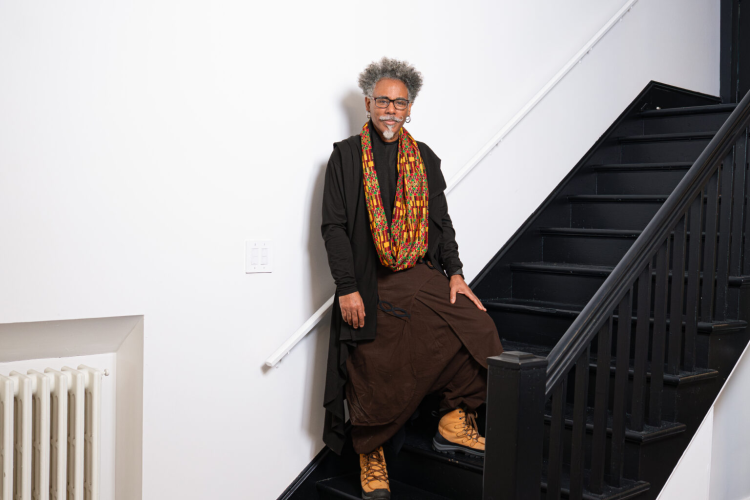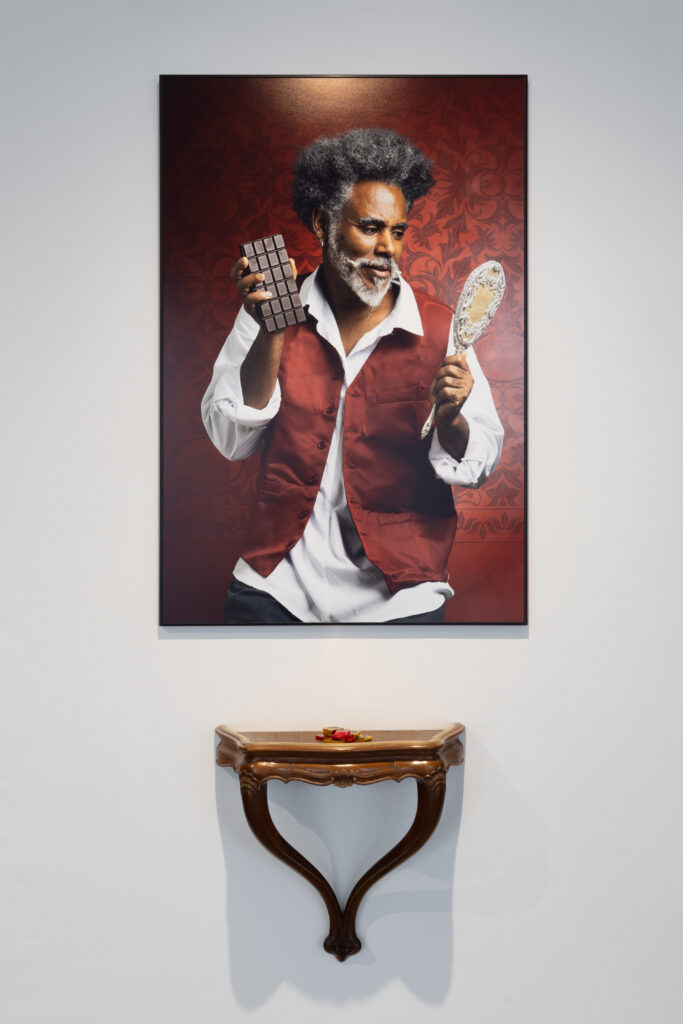NSCAD welcomes Dr. Eddy Firmin as the university's new Canada Research Chair (Tier 2) in Transatlantic Black Diasporic Art and Community Engagement.
He is the first Black visual artist in Canada to hold a CRC. But honoring the work that has gone before him, he also walks in the footsteps of Art Historian Dr. Charmaine Nelson, who was NSCAD's first Black CRC; she was a Tier I Canada Research Chair in transatlantic Black diasporic art and community engagement from 2020 to 2022.

NSCAD University welcomes Dr. Eddy Firmin as the new Canada Research Chair. Photo by Ginger Yu.
"It's an important step and one that I take really seriously," he says.
An assistant professor in the Division of Fine Arts, Firmin started at NSCAD in December 2024. His work will focus on two closely related practices: theoretical research that examines decolonial creative practices as systems of resistance, which is closely tied to an equally important second part: artistic practices and community engagement.
Born and bred in Guadeloupe (French Caribbean), he holds a PhD in Arts Studies and Practices from the Université du Québec à Montréal, and a master's degree from l'École Supérieure d'Art et Design le Havre-Rouen (France).
Artist, theorist, cultural worker and activist, Firmin was notably an expert advisor to the Montreal Museum of Fine Arts for the redeployment of its world culture collections in 2019 - renamed Wing for the Arts of One World' - and he exhibited his work Punching Bags in Venice during the 2022 Biennale.
Acting President Jana Macalik saw Punching Bags at OCAD University in 2023 and said it was instrumental in bringing Firmin to NSCAD.
"The first time I saw Punching Bags in Toronto. I was struck by the emotion and beauty in Eddy's work. The piece demanded awareness, responsibility and the courage to see each other. It reminded me that healing begins through acknowledgment.
"Dr. Firmin's appointment is a significant milestone for NSCAD. His leadership, creativity, and scholarship will not only enhance our research reputation but also strengthen knowledge and practice exchanges between our institution and African Nova Scotian and Black communities across Canada and abroad. We are honoured to welcome an artist of such depth and vision to NSCAD University."
CREATING A SAFE SPACE TO INTERROGATE BLACK ARTISTIC LEGACIES
Working out of 1871 Granville St., which offers direct, public access to the university, Firmin will host discussions, as well as practice-based and community-based work.
One of his initial plans is to build a safe, welcoming space at NSCAD where Black artists can interrogate Black history and Black artistic legacies.
"A safe space is really important, because we need to protect the new community that's going to be built. When I say new, I mean within the CRC. Let's not forget that there is a long history of mistrust between the academia and Black communities in North America. My objective is to reinforce bridges between African Nova Scotian, Caribbean and at large, Afro-Canadian communities."
There is an inherent paradox in teaching and studying decolonial practices in a colonial sphere, Firmin explains, which demands that his CRC operates both inside and outside the colonial structures of a university.
To work as a Black teacher, artist and scholar, he must preserve his independence, he says. Central to his practice is the idea of marronage: a methodology for enslaved peoples to escape, to create independent communities as a form of resistance.
"This is the point of the decolonial field. The decolonial can't go entirely into the institution - that won't work. It needs to go outside. So, literally in NSCAD, a place to come, a place to have a practice, and a place also to discuss that practice, to be in contact - but safely."
The independence of Marronage also pointedly addresses the ingrained mistrust that many Black communities have towards many western institutions.
"I have to take care that [NSCAD] can't hurt me during the process of transmission. The colonial system is well-made, and automatically there are people who will try to disrupt the transmission [of knowledge]. I have had some crazy, crazy experiences with professors in universities who have been aggressive with me right at the moment I'm launching communal activities. Fighting this systemic disruption of the transmission of ideas and practices within the Black communities will be one of my greatest challenges."
I'M INTERESTED IN IDEAS AND PRACTICES THAT ARE NOT IN THE WESTERN TRADITION'
Firmin's practice is firmly undisciplinary and communal, and his core research-creation work seeks to restore codes of Caribbean ancestral customs to modern visual media.
"Discipline is the western system. A system of squares and drawers that you put stuff into. Sometimes you need to break that. For the past 15 years, I've been constantly questioning the politics of sharing knowledge based on my Black and Caribbean origins, particularly Gwoka, where it doesn't work like that. There are no drawers. I relay that into my practice."
Gwoka is an ancestral Caribbean practice that blends dance, song, storytelling and music. It belongs to a very large family of Afro-Caribbean practices built up to resist colonial violence (such as Paracumbé, Guineo, Bélè, Calenda, Bomba, Tambú, etc.).
"I'm interested in ideas and practices that are not in the western tradition. What did the slave, my ancestor, give me? That's what I am interested in. We need to know what happened before us and how to pass that on."
That's why I'm here. To know how I can transmit all that to the communities who need it.
Eddy Firmin

Courtesy of Eddy Firmin. Photo by Michael Patten.
CONNECTING CARIBBEAN DECOLONIAL PRACTICES TO NOVA SCOTIA
Central to Firmin's research is the politics of knowledge sharing: This means teaching a certain understanding of the fact that our cultural matrix creates specific codes that enable us to know what we know and create what we create. This grounded approach of knowledge and creation allows us to understand the epistemological conflicts of the colonized artist, but above all it creates a space of profound tolerance and dialogue with otherness. In this respect, each of us understands the challenges facing the other, he explains.
Two products of his research that enable this conversation are Minorit'art, a free journal dedicated to these decolonial thought, and a Black Transnational Biennial called Afflux, the first contemporary art biennale dedicated to the dialogue between Black artists from Canada and abroad.
"Minorit'art is a free journal without an ISSN. It's not linked to a university. It's a way of being in and out of the university. It's kind of giving freely. Being a maroon is not something that you're going to pay for. It's a free review. It's giving free knowledge."
While he has spent the majority of his career in Quebec, Firmin sees many historical links and opportunities to connect his CRC activities to Nova Scotia.
"The Caribbean has a lot of connections with Halifax," he says, from the Jamaican Maroons, and the historic Transatlantic slave trade.
One of the things he has always done in his career as an academic is to teach while he's learning new ways of thinking, and he is looking forward to jumping right into teaching at NSCAD and learning from the Black communities in Nova Scotia.
"That's why I'm here. To know how I can transmit all that to the communities who need it."










